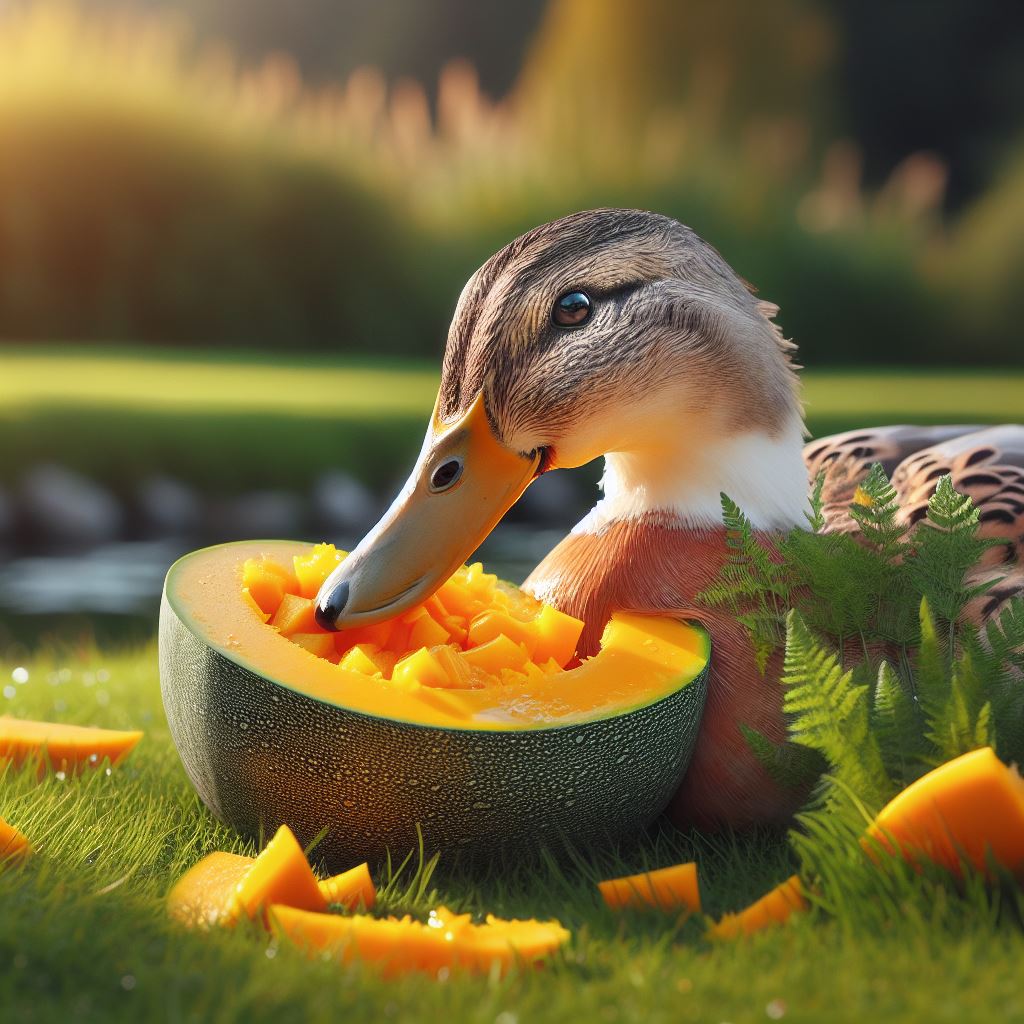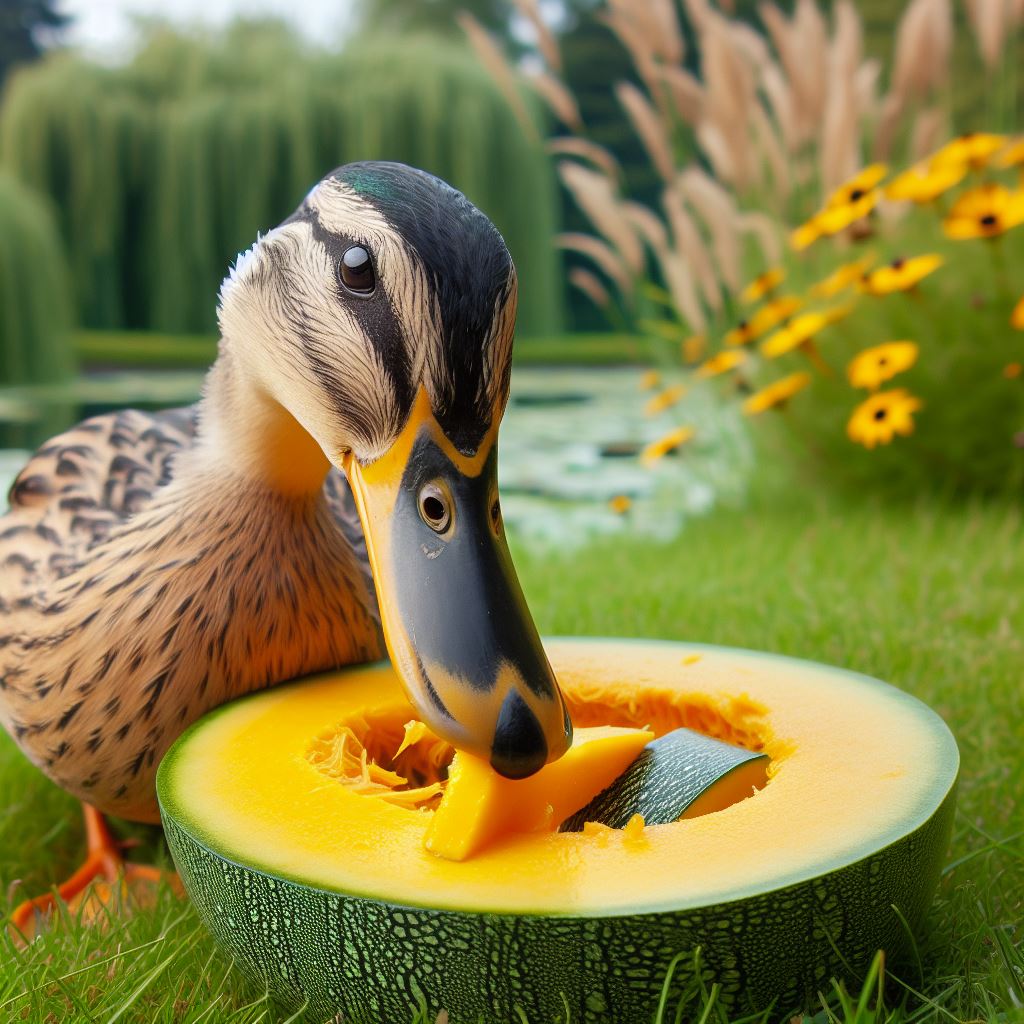Yes, ducks can safely eat most types of squash in moderation.
Squash provides beneficial nutrients like vitamins, minerals, and fiber.
However, too much squash may cause digestive upset in ducks.
When feeding squash to ducks, it’s important to remove the seeds first as they can pose a choking hazard.
Cut the squash into bite-sized pieces to make it easier to eat.
Both raw and cooked squash are fine for ducks, but avoid adding any seasonings.
I recommend consulting your veterinarian if you have any concerns about feeding squash to your ducks.
They can provide guidance on proper portion sizes and preparation based on your ducks’ age, health status, and other dietary factors.
For more details on the benefits of squash for ducks, how to prepare it, and how much to feed, be sure to check out my full article below.
I cover everything you need to know about feeding this nutritious veggie treat to your feathered friends.

- What types of squash are safest for ducks to eat?
- How often and in what quantities can ducks eat squash?
- Can baby ducklings eat squash or do you need to wait until they are older?
- Does cooking squash change whether it can be safely eaten by ducks?
- What nutrients are in squash that make it a healthy duck food?
- Are there any negative effects of feeding ducks too much squash? This asks about potential downsides of overfeeding.
- Helping resources:
What types of squash are safest for ducks to eat?
As an avian veterinarian with expertise in waterfowl, I can provide some guidance on which squash varieties are safest for ducks.
When feeding ducks fresh produce like squash, it’s important to keep a few key things in mind.In general, winter squashes tend to be better options than summer squashes for ducks.
Winter squashes like butternut, acorn, and pumpkin have thicker skins and firmer flesh that is more digestible for ducks.
Some summer squashes like zucchini can be fed sparingly, but their high water content can lead to loose droppings.Of the winter squashes, I typically recommend butternut or sugar pie pumpkins for ducks.
Butternut squash is a great source of vitamin A, potassium and beta-carotene.
The flesh is firm but not too tough, making it perfect for a duck’s digestive system.
Pie pumpkins are smaller, sweeter and easier for ducks to bite into than larger carving pumpkins.
Other winter squashes like acorn can also be fed safely.When preparing any squash for ducks, be sure to wash the skin, remove all seeds, and cut into bite-sized pieces that are easy to swallow.
This prevents choking hazards.
Only feed squash raw – cooked squash can harbor bacteria.
And as with any treat, squash should be fed in moderation – no more than 15% of the total diet.
How often and in what quantities can ducks eat squash?
Ducks can safely eat squash a few times per week as part of a balanced diet.
The optimal quantity depends on the duck’s size and age:As an avian veterinarian, I recommend feeding ducklings that are less than 7 weeks old a tablespoon of mashed squash once or twice a week.
Older ducklings and adult ducks can handle more – about 2 tablespoons of chopped raw or cooked squash two to three times per week is a good amount.Overfeeding squash can cause digestive upset, so it’s best to offer it in moderation.
Watch to see if your ducks have loose droppings after eating squash.
If so, cut back on the amount or frequency.
Make sure they always have access to fresh water as well when served squash.In terms of preparation, squash should be washed thoroughly, seeds removed, and chopped into bite-sized pieces.
Light cooking can help break down fiber and make it more digestible.
Both summer and winter squash varieties are safe for ducks.Adding some diced squash to your ducks’ diet a few times a week will provide beneficial nutrition from vitamins, minerals, and fiber.
Just be mindful of portions and monitor for any digestive issues.
Can baby ducklings eat squash or do you need to wait until they are older?
I would not recommend feeding baby ducklings any vegetables, including squash, until they are a bit older.
When ducklings first hatch, their digestive systems are still quite delicate and they require a specialized diet to support healthy growth and development.In the first few weeks of a duckling’s life, they should be fed a nutritionally balanced starter feed that has been specially formulated for baby waterfowl.
This feed contains the ideal ratio of proteins, carbohydrates, vitamins and minerals to meet their needs.
Around 3-4 weeks of age, once their digestive system has matured, you can start slowly introducing some fresh greens and vegetables.
But even then, I’d advise holding off on squash and other harder veggies until the ducklings are at least 6-8 weeks old.
Their digestive enzymes still need time to develop in order to properly break down and utilize plant foods.The good news is that once your ducklings are a bit older, most varieties of winter and summer squash make excellent supplemental treats!
The flesh is soft and loaded with beneficial nutrients like vitamin A, vitamin C and manganese.
Just be sure to cook the squash thoroughly and cut it into bite-sized pieces before feeding it to your ducks.
And as always, provide fresh clean water and nutritionally balanced duck feed as their dietary staples.
Does cooking squash change whether it can be safely eaten by ducks?
I can provide some insight into how cooking squash affects its safety for duck consumption.In short, cooking squash generally makes it safer and easier for ducks to digest.
Raw squash contains compounds that can be difficult for some ducks to break down, resulting in gastrointestinal upset.
Cooking helps break down these compounds.
Additionally, cooking softens the flesh, making it easier for ducks to tear and swallow.When feeding cooked squash to ducks, it’s ideal to steam or boil cubed or mashed squash until very soft.
Squashes to try include acorn, butternut, pumpkin, and zucchini.
Allow the squash to cool completely before offering it to ducks.
Avoid adding salt, spices, oil, or other flavorings.
Plain cooked squash is best.I recommend introducing cooked squash in small amounts at first to make sure your particular ducks tolerate it well.
Signs of intolerance would include loose droppings, lack of appetite, or obvious gastrointestinal distress.
If they enjoy the squash without issues, you can offer larger portions.

What nutrients are in squash that make it a healthy duck food?
Squash is a nutritious vegetable that can be a healthy addition to a duck’s diet when fed in moderation.
Specifically, squash contains vitamins A, C, and E, as well as several B-vitamins, potassium, magnesium, and fiber.Vitamin A supports vision, bone growth, reproduction, and immune system function in ducks.
Vitamin C aids collagen production for beaks and feet, helps absorb iron, and acts as an antioxidant.
Vitamin E also has antioxidant properties to prevent cell damage.
The B-vitamins help ducks convert food into energy and form red blood cells.Potassium regulates fluid balance in ducks’ bodies, transmits nerve signals, and causes muscles to contract.
Magnesium plays a role in bone formation, protein production, muscle and nerve function, blood glucose control, and blood pressure regulation.
Fiber aids digestion in ducks by promoting good gut bacteria.By providing this wide array of important vitamins, minerals, and fiber, squash can contribute valuable nutrients to enhance duck health and nutrition when included as part of a balanced diet.
Feeding ducks a proper commercial duck feed as their staple along with moderate amounts of fresh vegetables like squash makes for happy, healthy ducks.
Are there any negative effects of feeding ducks too much squash?This asks about potential downsides of overfeeding.
Effects of Overfeeding Ducks
| Negative Effect | Description |
|---|---|
| Poor nutrition | Foods like bread and corn are low in protein and nutrients ducks need. Overfeeding these leads to malnutrition. |
| Overcrowding | Abundant food attracts more ducks than the environment can naturally support. This stresses ducks and spreads disease. |
| Delayed migration | Well-fed ducks may delay seasonal migration, leaving them unprepared for winter. |
| Unnatural behavior | Ducks become aggressive and lose wariness of humans when fed. This puts them in danger. |
| Increased hybridization | Overfeeding attracts domestic ducks which interbreed with wild ducks. |
| Water pollution | Uneaten food decays in the water, harming fish and other wildlife. |
| Choking hazard | Ducks can choke on large pieces of bread or food. |
| Disease transmission | Salmonella, botulism and parasites spread more easily when ducks congregate to be fed. |
Helping resources:
[1] https://ducksguide.com/can-ducks-eat-squash/
[2] https://happyfarmyard.com/can-ducks-eat-squash/
[3] https://www.hgtv.com/outdoors/gardens/animals-and-wildlife/snacks-ducks-love
[4] https://www.backyardchickens.com/threads/will-ducks-eat-squash-seeds.1436489/
[5] https://canduckseat.com/vegetables/squash/
